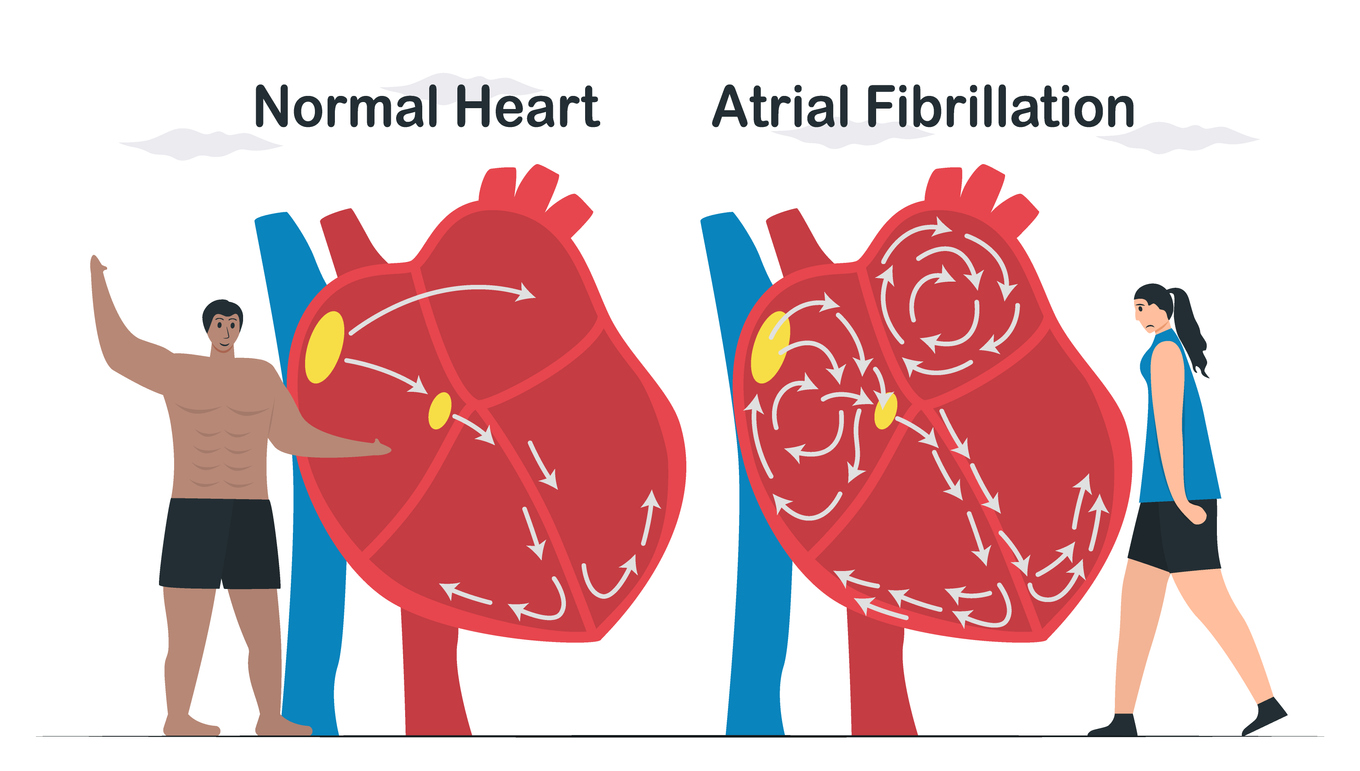
Atrial Fibrillation
What is atrial fibrillation?

Atrial fibrillation, or AF, is a common type of arrhythmia which causes the heart to beat irregularly and often fast.
Atrial fibrillation is where the normal electrical trigger for the heart beat becomes disrupted in the heart’s top chambers, the atria. The regular pumping action is replaced by rapid, erratic electrical signals that result in a quivering motion in the atria.
The risk of developing AF increases as you age. You may hear AF being described as paroxysmal, meaning you switch in and out of AF or permanent, meaning your heart is continuously beating in an irregular fashion.
The quivering motion of the lower chambers of the heart reduces the efficiency of the hearts pumping function. The increased heart rate experienced by patients in AF can lead to symptoms which affect their quality of life.
What are the symptoms of AF?
What are the symptoms of AF?

Symptoms of AF can include:
- palpitations (a fluttering or thumping feeling in the chest or throat)
- shortness of breath
- light-headedness or fainting
- chest pain or heaviness, fatigue
- feelings of irritability
- anxiety or general unwellness
- reduced exercise capacity or endurance
Not all people with AF experience noticeable symptoms, and there is tremendous variety in symptoms from person to person.
Episodes of atrial fibrillation may come and go, or you may develop AF that doesn’t go away. When properly treated, AF itself usually is not life-threatening. It is however a serious medical condition that sometimes requires prompt treatment.
What causes AF?
While the exact cause of AF isn’t always known, there are a number of risk factors that can increase your risk of developing the disease including:
Age
Underlying heart problem
High blood pressure
Other medical conditions
Surgery
Excessive alcohol consumption
Obesity
Family history
What are the health risks of AF?
A small number of people may go through life with AF and have little or no health problems from the condition. However, the inefficient pumping action caused by AF may lead to weakness of the heart muscle resulting in heart failure, or it may worsen any existing heart problems.
One of the greatest health risks from AF is an increased risk of stroke.
- People with a current or past diagnosis of AF have around five times the risk of having a stroke as a person without AF
- AF leads to an increased risk of a blood clot forming in the top chambers of the heart (in particular, the left atrial appendage) which can dislodge and travel to the brain, causing stroke
For people with AF, the risk of blood clots and stroke is not necessarily reduced when the heart is in normal rhythm.

Goals of treatment
How well AF responds to treatment depends on the type of AF, which is characterised by the duration of the arrhythmia and individual episodes.
Lifestyle modifications
Your GP and cardiologist will work together to support you to make the necessary lifestyle changes required to reduce their impact on your atrial fibrillation.
Rate/rhythm control
Reduce symptoms and risk of heart muscle damage that can lead to heart failure. Your cardiologist will first discuss drug treatment. If drug treatment is unsuccessful at managing how fast your heart is beating and you continue to experience symptoms your cardiologist may discuss a minimally invasive option of catheter ablation with you
Stroke prevention
Ischemic strokes caused by AF can lead to significant disability or death. To reduce this risk you will often be prescribed lifelong oral anticoagulation. The choice of anticoagulation will depend on your age and other conditions you have. If you have or develop a contra-indication to these treatments, you may be offered an alternative procedure to reduce your risk of stroke.
How is AF diagnosed at Advara HeartCare?
How is AF diagnosed at Advara HeartCare?
To diagnose AF, your doctor will review your symptoms, conduct a physical examination and run some tests. You may then be referred on to a cardiologist for further testing.
One of more of the following tests may be conducted to diagnose AF:
Holter monitor – to record your hearts activity over a 24 hour period
Echocardiogram – to see how your heart chambers and valves are pumping blood through your heart.
Electrocardiogram– to measure your hearts electrical signals
Stress echo or stress ECG – to see how your heart performs during exercise
If none of these tests return a clear result and you are still experiencing symptoms, you may have a loop recorder implanted. This will continually record the electrical activities of your heart, and detect abnormal heart rhythms. It is a small device implanted using a small incision under your skin around the chest area.
This information is of a general nature. If you are concerned about your heart health, discuss this with your local doctor.

